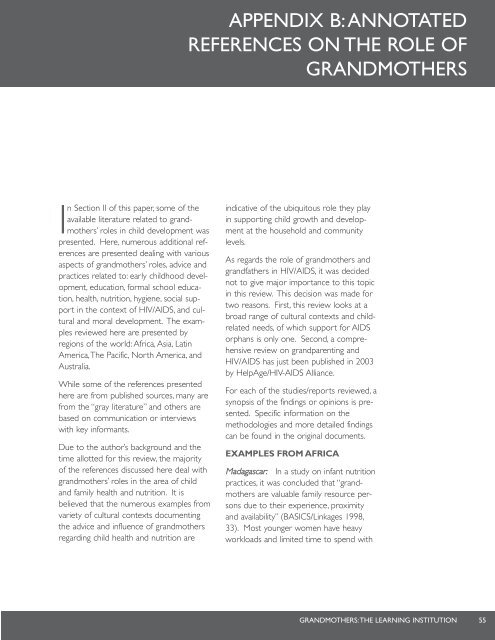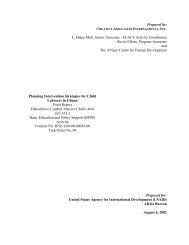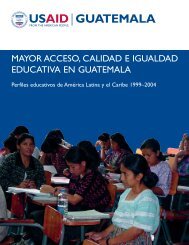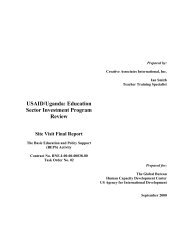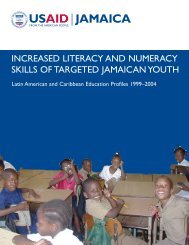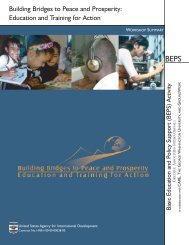Grandmothers: A Learning Institution - Basic Education and Policy ...
Grandmothers: A Learning Institution - Basic Education and Policy ...
Grandmothers: A Learning Institution - Basic Education and Policy ...
- No tags were found...
Create successful ePaper yourself
Turn your PDF publications into a flip-book with our unique Google optimized e-Paper software.
APPENDIX B:ANNOTATEDREFERENCES ON THE ROLE OFGRANDMOTHERSIn Section II of this paper, some of theavailable literature related to gr<strong>and</strong>mothers’roles in child development waspresented. Here, numerous additional referencesare presented dealing with variousaspects of gr<strong>and</strong>mothers’ roles, advice <strong>and</strong>practices related to: early childhood development,education, formal school education,health, nutrition, hygiene, social supportin the context of HIV/AIDS, <strong>and</strong> cultural<strong>and</strong> moral development. The examplesreviewed here are presented byregions of the world: Africa, Asia, LatinAmerica,The Pacific, North America, <strong>and</strong>Australia.While some of the references presentedhere are from published sources, many arefrom the “gray literature” <strong>and</strong> others arebased on communication or interviewswith key informants.Due to the author’s background <strong>and</strong> thetime allotted for this review, the majorityof the references discussed here deal withgr<strong>and</strong>mothers’ roles in the area of child<strong>and</strong> family health <strong>and</strong> nutrition. It isbelieved that the numerous examples fromvariety of cultural contexts documentingthe advice <strong>and</strong> influence of gr<strong>and</strong>mothersregarding child health <strong>and</strong> nutrition areindicative of the ubiquitous role they playin supporting child growth <strong>and</strong> developmentat the household <strong>and</strong> communitylevels.As regards the role of gr<strong>and</strong>mothers <strong>and</strong>gr<strong>and</strong>fathers in HIV/AIDS, it was decidednot to give major importance to this topicin this review. This decision was made fortwo reasons. First, this review looks at abroad range of cultural contexts <strong>and</strong> childrelatedneeds, of which support for AIDSorphans is only one. Second, a comprehensivereview on gr<strong>and</strong>parenting <strong>and</strong>HIV/AIDS has just been published in 2003by HelpAge/HIV-AIDS Alliance.For each of the studies/reports reviewed, asynopsis of the findings or opinions is presented.Specific information on themethodologies <strong>and</strong> more detailed findingscan be found in the original documents.EXAMPLES FROM AFRICAMadagascar: In a study on infant nutritionpractices, it was concluded that “gr<strong>and</strong>mothersare valuable family resource personsdue to their experience, proximity<strong>and</strong> availability” (BASICS/Linkages 1998,33). Most younger women have heavyworkloads <strong>and</strong> limited time to spend withGRANDMOTHERS:THE LEARNING INSTITUTION55


